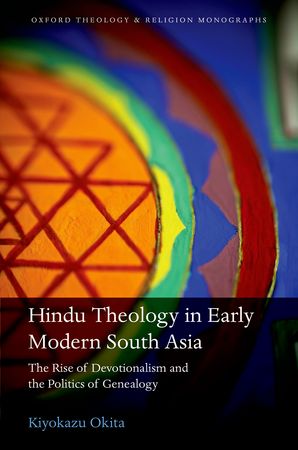An intellectual journey
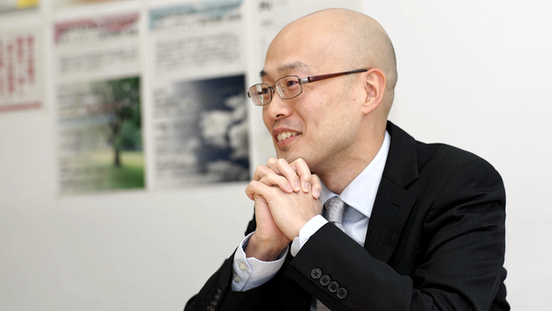
An interview with
Kiyokazu Okita
Assistant Professor
The Hakubi Center for Advanced Research
"Gods" -- what are they? What do they mean to humans? Kiyokazu Okita followed his intellectual curiosity to pursue religious studies in the USA, the UK, Germany, and India, before arriving at Kyoto University. Based on his research on the feelings of romance and friendship that the followers of a Hindu tradition have for the god Krishna, as revealed in classical Sanskrit literature, Dr Okita shares his thoughts on what we can gain from a deeper understanding of South Asia.
When did you visit India for the first time?
Okita: I attended Rokko Gakuin, a Jesuit high school in Kobe. This school collects donations for a hospital in India that takes care of patients suffering from leprosy. Every three years, the school organizes a visit to this hospital. I joined this tour when I was seventeen years old. During our visit, we met Mother Theresa. It was half a year before she passed away. It was also at this point that I was exposed to the philosophy of non-violence propounded by M.K. Gandhi. In many ways, our visit to India was an eye-opening experience for me.
I see. Your high school trip was a starting point for your research. What happened next?
Okita: After high school, I attended International Christian University in Tokyo. I studied Indian intellectual history and Protestant theology. For my thesis, I wrote about interreligious dialogue between Hinduism and Christianity. During my undergraduate years, I spent a year at the University of California, Santa Barbara. The friends I made there recommended that I pursue a master's and doctorate at Oxford. After finishing my undergraduate degree, I moved to the UK to continue my research on interreligious dialogue. When I finished my master's, I decided to focus on Hinduism and spent the first three years of my PhD mainly studying Sanskrit. Then I met Prof Harunaga Isaacson (University of Hamburg) who was willing to read texts with me. So, I spent two years in Hamburg, Germany.
What does it mean that this professor was willing to read texts with you?
Okita: Let's say I have a Sanskrit text that I want to study. Of course, I have my own interpretation, but there can be many interpretations, and mine may or may not be appropriate. So, first I prepare my English translation, then I organize a reading session with my teachers and colleagues to discuss my translation. In these reading sessions, we literally check my translation word by word. The traditional European method of understanding Greek and Latin philology is now applied to Sanskrit philology. It is important to read with a teacher who is experienced in this philological methodology.
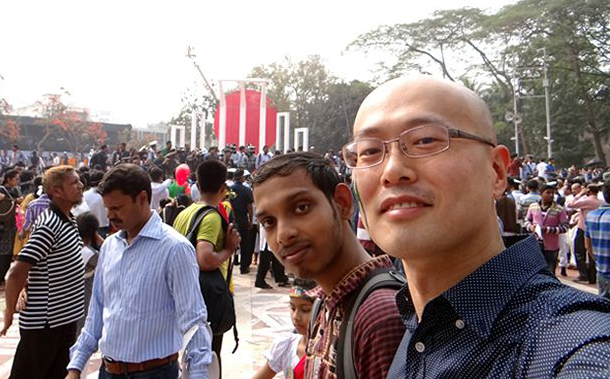 Assistant Professor Okita with his personal Bengali tutor Mr Shimanto at the International Mother Language Day held in Dhaka, Bangladesh, in February 2015
Assistant Professor Okita with his personal Bengali tutor Mr Shimanto at the International Mother Language Day held in Dhaka, Bangladesh, in February 2015
Hindu Theology in Early Modern South Asia
Kiyokazu Okita
Oxford Theology and Religion Monographs
Oxford University Press, July 2014
Publisher's webpage: http://ukcatalogue.oup.com/product/9780198709268.do#
CiNii Books: http://ci.nii.ac.jp/ncid/BB17186709
It must be a time-consuming process! Last year you finally published a book based on your doctoral thesis.
Okita: Yes, my book was published by Oxford University Press last year. It took ten years since I started my research.
Your research is focused on a popular Hindu deity Krishna. How did you come to work on this topic?
Okita: I had constantly been surrounded by Christians since middle school and high school. But I couldn't come to understand their concept of God, and I've always held intellectual curiosity on the topic. When we talk about "God", we usually think of a supreme being higher than us. However, Krishna is a simple cowherd boy. The ideal in the Vaishnava tradition -- a Hindu school -- is to create a situation in which they can relate to Krishna as his parent or his lover. He is an ordinary village boy and a supreme God who creates, maintains, and destroys the universe, all at the same time. I'm intrigued by the closeness between God and human beings in the Vaishnava tradition.
What is your experience collecting research materials in India and Bangladesh? It is probably not a straightforward task...
Okita: Yes, working in South Asia can be difficult. When you want to look up certain texts in a library, sometimes you can't access the material you want immediately. First you have to drink tea with the librarians, and eat samosas and chat with them. They want to know whether you are married, where your wife is, and whether you have children. It is only after developing a personal relationship that you can ask, "By the way, do you have such and such text?" In many ways, it is a very different working culture, and we cannot expect to work there as we do for example in Japan. Libraries in the West tend to understand how we do research, so they let us take photos, but it doesn't work that way in South Asia.
We need to be patient to learn how the system works in a particular culture.
What is exciting about your research?
Okita: Many Sanskrit scholars believe Classical Sanskrit declined after the 12th century. However, my research focuses on Sanskrit literature during the Mughal period (16th to 19th century). In Japanese history this roughly corresponds to the Edo period. In terms of research on South Asia, the primary focus of area studies is after the 19th century. Therefore, there is a lack of research exploring the period from the 13th to the 18th century. However, just as the study of the Edo period is vital in understanding the Meiji period, understanding South Asian culture during the Mughal period is crucial in understanding South Asia in the colonial and post-colonial period. Through my research, I hope to trace the roots of the dynamism that is apparent in present-day South Asian culture.
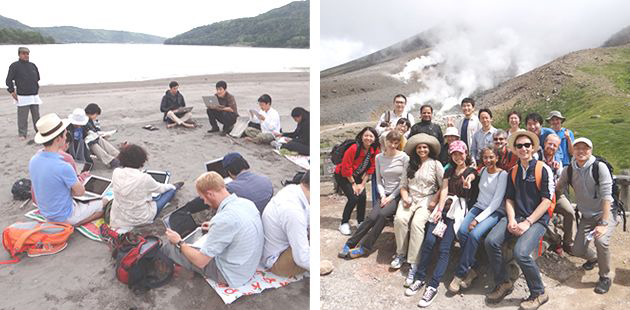 Left: Sanskrit study camp organized jointly by the Hakubi Center for Advanced Research and the Department of Indological Studies, Graduate School of Letters, held in Tenninkyo, Hokkaido, in August 2014. Right: an outdoor reading session
Left: Sanskrit study camp organized jointly by the Hakubi Center for Advanced Research and the Department of Indological Studies, Graduate School of Letters, held in Tenninkyo, Hokkaido, in August 2014. Right: an outdoor reading session
What can we learn from the ideas from the period you are researching?
Okita: For the past two decades or so, the philosophy of emotion has caught scholarly attention in the West. The classical thinkers examined in this field are mostly from the West, such as Socrates, Descartes, and Spinoza. Nevertheless, in South Asia there has been a long tradition of dramaturgy since the 4th century which explores how to convey romantic emotion through dramatic stage setting and acting. The theory of emotion developed in this tradition was then incorporated into Sanskrit poetics. Later, in the 14th and 15th centuries, religious thinkers further integrated this theory into religious thoughts. For example, they analyzed how one could effectively express their loving devotion to Krishna through poetry. Currently, I am exploring how this South Asian theory of emotion can contribute to the philosophy of emotion.
How would you like to develop your research in the future?
Okita: First, I would like to explore the possibility of conversation between Western philosophy and South Asian intellectual traditions in terms of theories of emotion. Then I want to examine the Hindu-Muslim relation during the Mughal period. Historically, South Asia has had a large Muslim population. I am particularly interested in the interactions between Sufism and Hindu devotional traditions. Besides these two areas of interest, I also want to increase my exposure to lived culture in South Asia by learning local languages. So far I have been more of an armchair philosopher, translating and analyzing Sanskrit texts in the comfort of my study room. I'd like to live in the field of my research for a longer period and interact with local people, like anthropologists.
South Asia, Classical Sanskrit -- they sound exciting but perhaps not so relevant to our day-to-day life. What is the significance of your research for Japan?
Okita: Be it Hinduism or anything else, I believe it is extremely important for people to learn about cultures other than their own. If people only have experience living in their own country, know only their mother tongue, and interact only with their fellow countrymen and women, they might come to believe that the customs and the value systems in their country are universally valid. This false sense of universalism can easily lead us to exclude others who have different customs and value systems. When we live next to someone who comes from a completely different social and cultural background, we can only interact with them with respect when we can relativize our world view. Socrates famously said, "The unexamined life is not worth living". I want to provide South Asian thought as a measure against which we can relativize the value system and the world view that we accept in our daily life.
How do you evaluate the research environment at Kyoto University?
Okita: Based on my research experience in the UK, Germany, and the US, I can say that Kyoto University's research environment is internationally competitive and attractive. I am surrounded by wonderful colleagues with whom I work closely. Moreover, The Hakubi Center for Advanced Research has been extremely supportive of my research. At the same time, I must point out that the university could provide more support for its foreign researchers. My wife is American, and I see how she is faced with linguistic and cultural challenges in day-to-day life in Japan. Some of my colleagues from abroad have left Kyoto University, even though they were more than satisfied with the research environment provided. Why? Because their family found it difficult to live in Japan. If we develop a system to support foreign researchers and their families in daily life, I believe Kyoto University can become an even more attractive hub for research.
Published: 20 November 2015
* This article is a translation of an interview originally published in Japanese at K.U.RESEARCH on 24 April 2015.
- Biographies of Kyoto University's Personnel: Kiyokazu Okita
http://research.kyoto-u.ac.jp/people/okita/01/ - K.U.RESEARCH
http://research.kyoto-u.ac.jp/
Profile
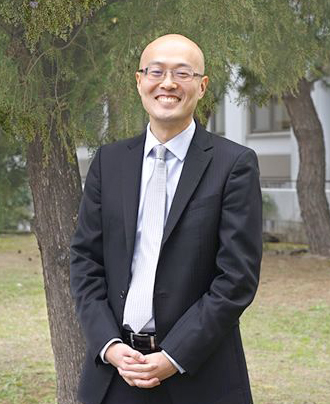
Kiyokazu Okita graduated from International Christian University, Tokyo, in 2002, and pursued his postgraduate studies at the University of Oxford, receiving a DPhil in Theology in 2011. Prior to joining the Hakubi Center for Advanced Research at Kyoto University, he served as a post-doctoral research fellow at the Asia-Africa-Institute, University of Hamburg, Germany. His current research focus is on the faith tradition centered on the Hindu god Krishna, and especially on the idea of seeing this deity as one's lover.


